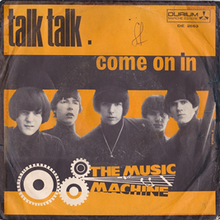Talk Talk (The Music Machine song)
| "Talk Talk" | ||||
|---|---|---|---|---|

Cover of the 1966 Italian single
|
||||
| Single by The Music Machine | ||||
| from the album (Turn On) The Music Machine | ||||
| B-side | "Come on In" | |||
| Released | November 1966 | |||
| Format | 7" | |||
| Recorded |
|
|||
| Genre | ||||
| Length | 1:56 | |||
| Label | Original Sound | |||
| Songwriter(s) | Sean Bonniwell | |||
| Producer(s) | Brian Ross | |||
| The Music Machine singles chronology | ||||
|
||||
"Talk Talk" is the debut single of the American garage rock band, The Music Machine. The song was released in November 1966, and produced the band's only Top 20 hit on the Billboard Hot 100. It was then included on their debut album, (Turn On) The Music Machine. The single is an early example of proto-punk.
The Music Machine was practicing the song before any interest from record producers. Sean Bonniwell strived to perfect the sound he had been experimenting with in preparation for a record deal. The band regularly played at an American Legion bowling alley in Los Angeles. Bonniwell was originally involved in the folk rock scene, but he wanted to create a harder sound or as he stated "something completely unique". To create his designed sound, Bonniwell had the band tune their instruments from the typical E to the D flat, creating a heavy, atonal effect. Bassist, Keith Olsen, utilized a fuzz box to produce the song's signature bassline, which was backed by Mark Landon's wiry guitar playing. This new way of playing caught the attention of record producer, Brian Ross, who brought them into studios to record a single.
Recording in RCA Recording Studios took only three hours at the expense of $150. The song took two takes and the planned A-side, "Come On In", in only one. "Come On In" was later replaced by "Talk Talk" when record producers deemed it suitable for an A-side release. The "Talk Talk" track clocked at one minute and 56 seconds, yet still compiled four distinctive rhythm changes. Engineer, Paul Ruff, innovated the recording by using a ten-track recording machine when most recording artists only had a four-track. Keyboardist, Doug Rhodes, played the farfisa organ, which had its sound sliced and separated numerous times. The Music Machine was soon signed to the Original Sound label to release the single. "Talk Talk" became a hit upon its release when it eventually charted at number 15 on the national charts, remaining on the charts for 12 weeks, and also reached top ten in several L.A. charts. A.M. Radio constantly played the song due to its short track length, giving it added exposure. While touring, the song became a favorite among the band's fans, so the composition was regularly extended. The track was subsequently released on December 31, 1966 as the opening to the group's debut album, (Turn On) The Music Machine.
...
Wikipedia
